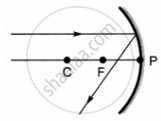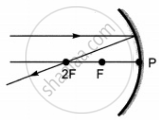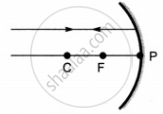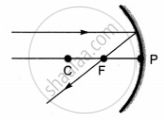Advertisements
Advertisements
Question
A student obtained a sharp image of the grills of a window on a screen using a concave mirror. His teacher remarked that for getting better results a well lit distant object (preferably the sun) should be focussed on the screen. What should be done for this purpose?
(A) Move the screen slightly away from the mirror
(B) Move the mirror slightly towards the screen
(C) Move the screen and the mirror away from the object
(D) Move the screen and the mirror towards the object
Solution
As the image distance is increased, the object distance would decrease and thus mirror-screen distance should be decreased. The mirror should be moved towards the screen.
The Correct Answer is B
RELATED QUESTIONS
It is desired to obtain an erect image of an object, using concave mirror of focal length of 12 cm.
What should be the range of distance of an object placed in front of the mirror?
ill in the following blank with suitable word:
For a convex mirror, parallel rays of light appear to diverge from a point called the ......... .
Draw diagram to represent the action of a concave mirror on a beam of parallel light rays. Mark on this diagram principal axis, focus F, centre of curvature C, pole P and focal length f, of the concave mirror.
In the concave reflector of a torch, the bulb is placed:
(a) between the pole and focus of reflector
(b) at the focus of reflector
(c) between focus and centre of curvature of reflector
(d) at the centre of curvature of reflector
One of the following does not apply to a concave mirror this is:
(a) focal length is negative
(b) image distance can be positive or negative
(c) image distance is always positive
(d) height of image can be positive or negative
Write down a formula for the magnification produced by a concave mirror.
in terms of height of object and height of image
An object 3 cm high is placed at a distance of 8 cm from a concave mirror which produces a virtual image 4.5 cm high:
(i) What is the focal length of the mirror?
(ii) What is the position of image?
(iii) Draw a ray-diagram to show the formation of image.
Why does a beam of light when it enters glass at an angle? Why does it not bend if it inters the glass at right angles?
List four characteristics of the image formed by a concave mirror of focal length 40 cm when the object is placed in front of it at a distance of 20 cm from its pole.
Which of the following ray diagrams is correct for the ray of light incident on a concave mirror as shown in figure?

 |
 |
 |
 |
| A | B | C | D |
